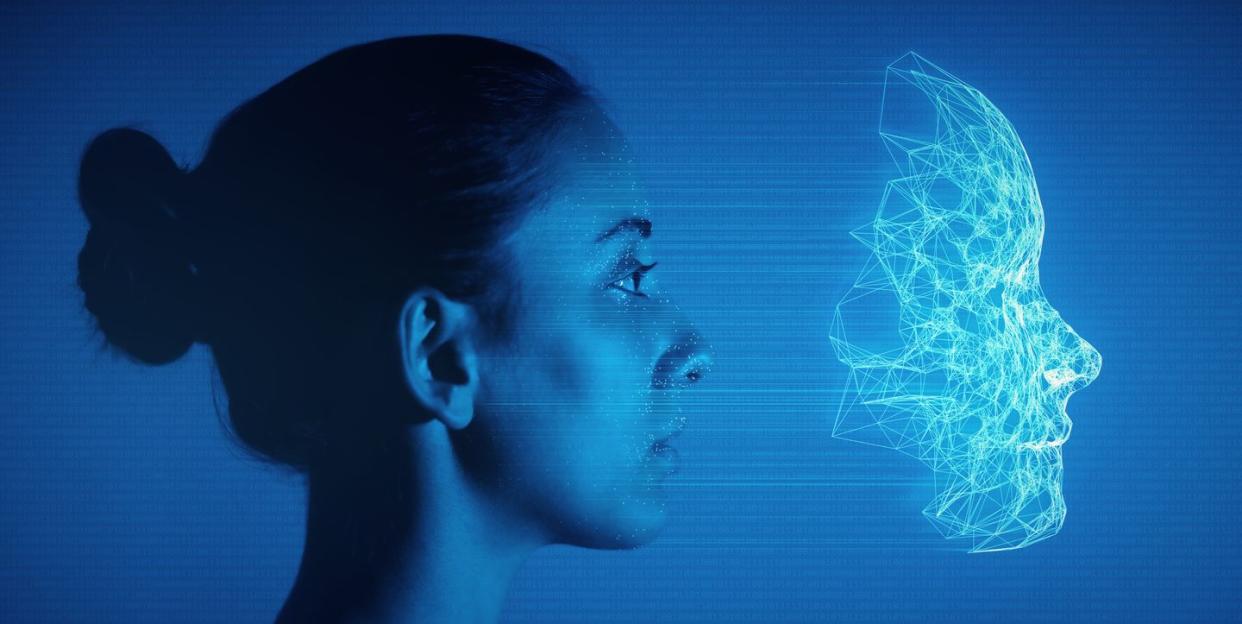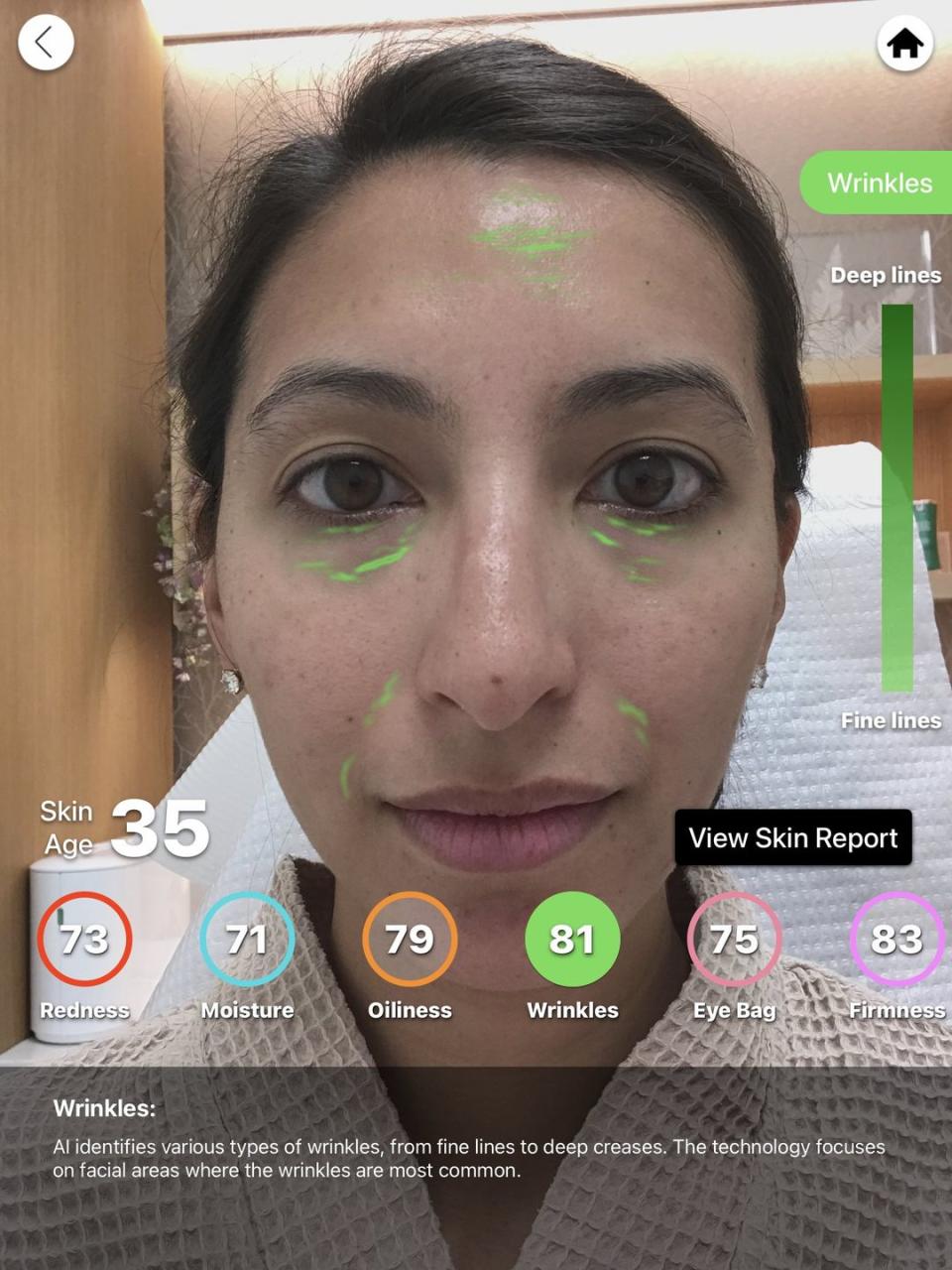Artificial Intelligence Is Coming for Your Skincare Routine

When I agreed to have an artificial intelligence-powered app determine the age of my skin based on a scan of my face, I wasn’t sure what to expect.
While I’m religious about sunscreen and have dabbled with injectables, I also have acne-prone skin that’s led to a bunch of dark spots—and, also, I’m tired.
A few moments after my photo was taken with an iPad, the Perfect Corp AI Skin Analysis app informed me that my “skin age” is 35 years old. (My actual age is 33.) Rude.
But that’s the risk of this kind of information, says Eunice Park, M.D., a double board-certified facial plastic surgeon in Syosset, New York, who invited me into her office to try the tech.
“It can be a little bit hard for patients to digest,” she says. “I’ve had situations where it shows the patient is much older because they have, let's say, a lot of sun damage.”
Meet the Experts: Eunice Park, M.D., is a double board-certified facial plastic surgeon based in Syosset, NY. Gabriella Baki, Ph.D., is a professor and the director of the BSPS Cosmetic Science and Formulation Design Program at the University of Toledo in Ohio. Steven Feldman, MD, is a professor of dermatology at Wake Forest University School of Medicine
Dr. Park now uses this app in all of her consultations, where it helps create the foundation for her treatment plans and can also help quantify progress. For example, if someone’s score for, say, sun spots improves after a laser treatment, it may lead to better patient satisfaction.
“It's just a nice, general number that helps to give people information on the current state of their skin health,” she says. “It allows us to be able to quantify certain conditions, give [them] a number, and then be able to say, ‘Hey, these are your options’.”
In addition to sun damage, the app grades skin on 13 other parameters including wrinkles and fine lines, Dr. Park says, so she’s able to recommend injectables to smooth them out. It also takes into account things like pores, dark spots, and acne, which I assumed would be pain points in my evaluation.
What surprised me, though, was just how pronounced my under-eye bags were in the wrinkles measurement (image below), which helpfully highlighted them in green (I’m eight months pregnant, by way of explanation). I can see how it’s disheartening to invest so much time into your skincare routine only for AI to tell you that you look…fine.

Artificial intelligence in beauty isn't new.
This AI app, powered by Taiwanese tech company Perfect Corp, is just one of a million ways AI is seeping into our everyday lives. If the headlines have it right, AI is coming for our jobs, our music, and even our glute-training plans—for better or for worse. And while it may be new on some fronts, it’s actually not a groundbreaking development for the beauty industry, which has been something of a guinea pig for AI technology in recent years.
On a consumer level, you can already find AI “when we interact with ‘digital sales associates’ and ‘bots’ on websites, for product try-ons, and for detecting skin concerns to create customized regimens for consumers,” says Gabriella Baki, Ph.D., a professor and the director of the BSPS Cosmetic Science and Formulation Design Program at the University of Toledo in Ohio. She points to the Olay Skin Advisor and La Roche-Posay’s MyRoutine AI as two examples of private companies already putting this tech to use to draw new customers.
But AI's use in dermatology is a recent development.
Its use in a medical practice is newer—but has momentum behind it. Case in point? A recent study—funded by Perfect Corp—from Wake Forest University found the app to be“a convenient, practical, accessible method to analyze patients’ skin.”
Steven Feldman, MD, the professor of dermatology at Wake Forest University School of Medicine who helmed the research, found that it scored similarly to his own expert assessment. He also says that the app provides similar results as more expensive, bulky devices dermatologists can use to measure skin health. That wasn’t a surprise to him.
“The cameras can see better than I can...They can see wavelengths that the human eye can't detect,” he says. “The accuracy of the artificial intelligence devices should at some point exceed that of a dermatologist—and may be more unbiased in how they look at things.”
And that objectivity is one of the key benefits of this technology.
“I don't think that we are the best judge of ourselves when it comes to certain parameters,” says Dr. Park. “I usually give the example of an eyewitness. Even in a court of law, what people remember even at the scene of a situation is just not accurate.”
In the case of your face, you might not think that a syringe of filler did all that much for your under-eye bags, but the app can actually show you an improvement with a diagram on the screen, like one of those “Spot the Difference” photo puzzles.
There's still work to be done, though.
Of course, as with any new technology, there are kinks. A big one specific to the use of AI in skincare and dermatology is inclusivity, as reports have noted.
However, it’s improving, especially as more and more people use AI tools and, in doing so, share their data.
“AI is a powerful tool, but it needs a lot of data to work accurately and provide reliable predictions—and when I say a lot, I mean hundreds of thousands to millions of fragments of information coming from hundreds of thousands of consumers,” says Dr. Baki. “The more data an AI tool receives, the better the learning is and the more reliable the predictions are.”
But therein is a major caveat.
“AI is continuously being improved during use as consumer information is being received— this is where consumer privacy and potential privacy concerns come into the picture,” she says. That big push for data? It only comes when consumers allow their data to be used. And many people do, since it tends to be built into the terms and conditions when you agree to use a given program or app.
Not only that, but when you’re working with this type of information, it helps immensely to have an expert offer context and guidance to the results. With that in mind, says Dr. Park, “an in-person evaluation is always the best way to determine what the next best treatments are for you.”
So, AI is not supposed to replace an appointment with your doc, but to give you a good visual as it unfolds. Plus, the app is only available to professionals at this point, so it’s not like you can take it for a spin in your bathroom mirror.
The Bottom Line
By the time I left my appointment with Dr. Park—after which a facial treatment left my skin more radiant and possibly worthy of a sub-30-years-old skin age—I was still mulling over the power of the AI Skin Analysis app.
Was it mildly unpleasant to see my various lines and wrinkles and dark spots and large pores highlighted on a screen? Yes. But will it make me just a little more conscious about how often I reapply sunscreen during the day? Also yes.
Looking at it that way, it’s hard to deny its appeal for both providers and patients alike.
You Might Also Like

